While Lima Charlie News joins the appeal of hundreds of news organizations for President Trump to end his crusade against what he regards as “fake news” (see Lima Charlie’s OpEd), it is important to keep in mind the colossal power over publishers wielded by ever-larger tech giants.
Today, over 300 U.S. newspapers coordinated by the Boston Globe’s editorial board are running columns condemning President Donald Trump’s attacks on prominent U.S. media outlets. The words in question are his description of “fake news” or “the fake news media,” and his accompanying accusation that the press is “the enemy of the people.”
The day was also marked by the unanimous passage by the U.S. Senate of a resolution affirming that “the press is not the enemy of the people.” The resolution, which includes quotes from Benjamin Franklin, Thomas Jefferson, James Madison, Ronald Reagan, and Supreme Court Justice Anthony Kennedy, reads:
“Resolved, that the Senate (A) affirms that the press is not the enemy of the people; (B) reaffirms the vital and indispensable role that the free press serves to inform the electorate, uncover the truth, act as a check on the inherent power of the government, further national discourse and debate, and otherwise advance the most basic and cherished democratic norms and freedoms of the United States; and (C) condemns the attacks on the institution of the free press and views efforts to systematically undermine the credibility of the press as an attack on the democratic institutions of the United States….”
President Trump and some members of his Administration have engaged in sustained rhetorical critique of the press. Innumerable Administration attacks on the press have been outlined by the PEN Institute.
Marjorie Pritchard, deputy managing editor of The Boston Globe, started reaching out to other editorial boards after the president used a campaign rally as a platform to harangue the news media present, in a series of non sequiturs sprinkled throughout his speech, such as:
“These people back here, these horrible, horrendous people.”
“Whatever happened to honest reporting?”
“Oh my God, what fake news!”
“What a group!”
“They are the fake, fake, disgusting news!”
“They don’t report it. They only make up stories.”
“They were giving you phony numbers.”
“Only negative stories from the fakers back there.”
“Why don’t you report that?”
The crowd got in on the president’s routine, chanting “CNN sucks.”
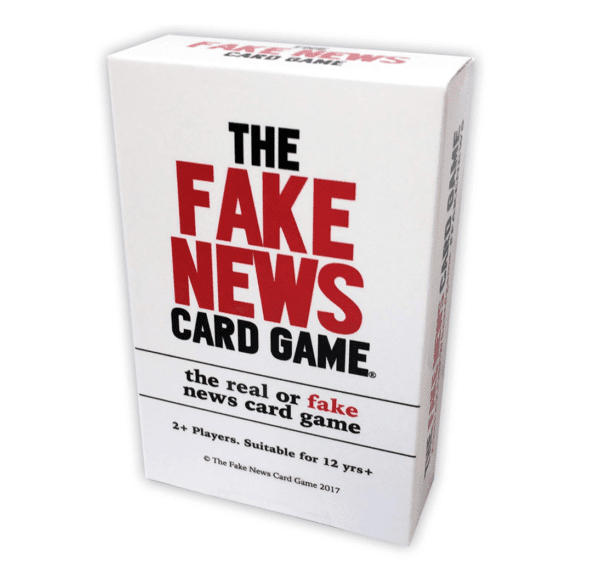
The president’s rhetorical animus towards the press comes after the Obama presidency, which already made the jobs of journalists more difficult. The Obama administration seized the phone records of journalists at the Associated Press, accessed the personal email of a Fox News reporter and surveilled his friends and family, set new records in withholding Freedom of Information Act requests, and effectively normalized the use of the Espionage Act to prosecute journalists.
Yesterday evening, the Trump Administration set yet another milestone in its efforts to restrict freedom of speech. White House spokesperson Sarah Sanders announced the revocation of former CIA Director John Brennan’s security clearance.
Sanders told reporters in a statement on Wednesday, “Mr. Brennan has a history that calls into question his objectivity and credibility.” The statement went on to allege that Brennan had been “leveraging” his security clearance in the media in order to make wild claims against the Trump administration.
This action is part of a broader effort by Mr. Trump to suppress freedom of speech & punish critics. It should gravely worry all Americans, including intelligence professionals, about the cost of speaking out. My principles are worth far more than clearances. I will not relent. https://t.co/TNzOxhP9ux
— John O. Brennan (@JohnBrennan) August 15, 2018
The revocation was accompanied by a list of names of other former intelligence officials who may have their clearance revoked. The people on the list, some of whom are presently employed by major media outlets, have all been strident critics of the administration.
On Wednesday, another potentially ominous headline for privacy and freedom of speech broke: the Trump White House has undone Obama’s guidelines on the use of offensive cyber weapons. These guidelines, spelled out in Presidential Policy Directive 20, set rules for when and how U.S. intelligence agencies could launch cyber attacks. Under Obama’s rules, intelligence agencies needed the permission of the president to launch attacks on U.S. domestic targets, with an exception for cases of emergency.
Thus far, the White House is refusing to respond to reporters’ requests for information, so it is unclear what, if any, restrictions on intelligence agencies have replaced the Directive 20. Presidential Policy Directive 20 remains classified, and journalists have only gained access to it due to the leaks of whistleblower Edward Snowden.
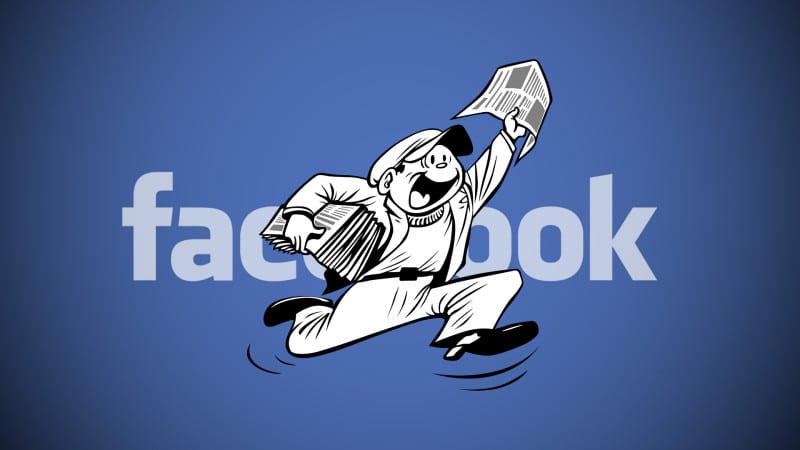
Meanwhile, on the Internet…
While Legacy Media, media outlets that are older than the advent of the internet, are lining up to defend their journalism, New Media is being confronted with a starker choice.
“We will help you revitalize journalism,” said Facebook executive Campbell Brown, in a meeting on Tuesday with a group of more than 20 smaller broadcasters and publishers. “In a few years, the reverse [of cooperating with Facebook’s “help”] looks like I’ll be holding hands with your dying business like in a hospice.”
Facebook has denied this statement, which was initially published by The Australian with the headline “Work With Facebook or Die: Zuckerberg.” However, they have also refused to release a transcript of the conversation and the quote has been corroborated by five of the people who attended the meeting in Sydney.
“Mark [Zuckerberg] doesn’t care about publishers,” Brown said, adding that the Facebook founder had empowered her to be magnanimous, by giving her “a lot of leeway and concessions to make these changes.”
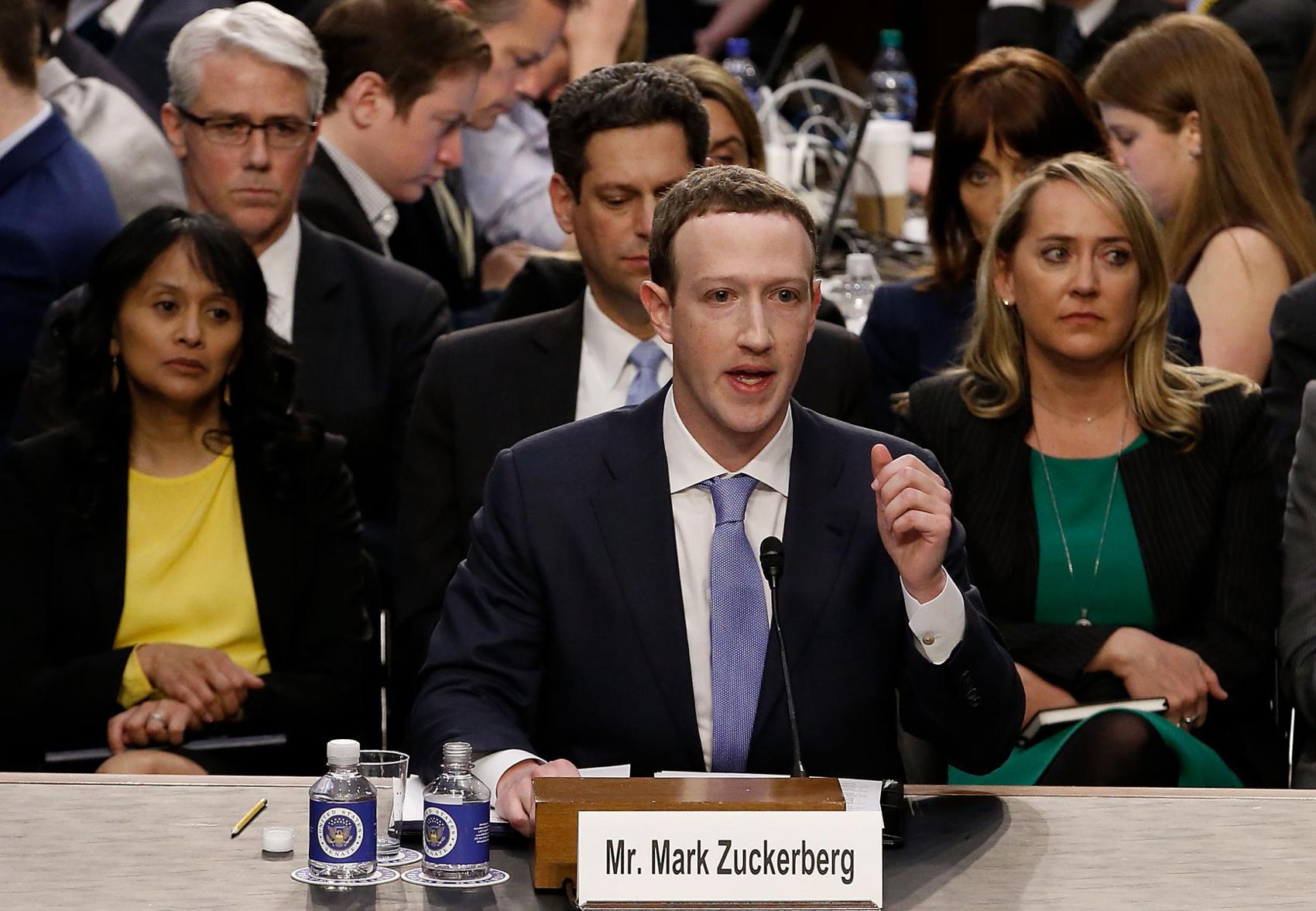
While a spokesman for Twitter had previously told Politifact that accounts associated with Jones were not in violation of Twitter rules, a screenshot has been shared informing Jones that his account has been suspended for a week. Now, a spokesman has explained that Jones’ personal account has been put into read-only mode for violating the site’s rules against abusive behavior. Jones’ account for his website, Infowars, is still freely active on the Twitter platform.
The purge of Jones’ accounts from these major platforms (with the exception of Twitter) occurred in the span of only about 24 hours. Jones has now published a piece on his website titled “EMERGENCY ALERT! ROGUE FEDS ARE SETTING UP INFOWARS TO BE SHUT DOWN” in response. In the accompanying video, Jones alleges that members of the government are working to “silence” him because “Something big’s about to happen.”
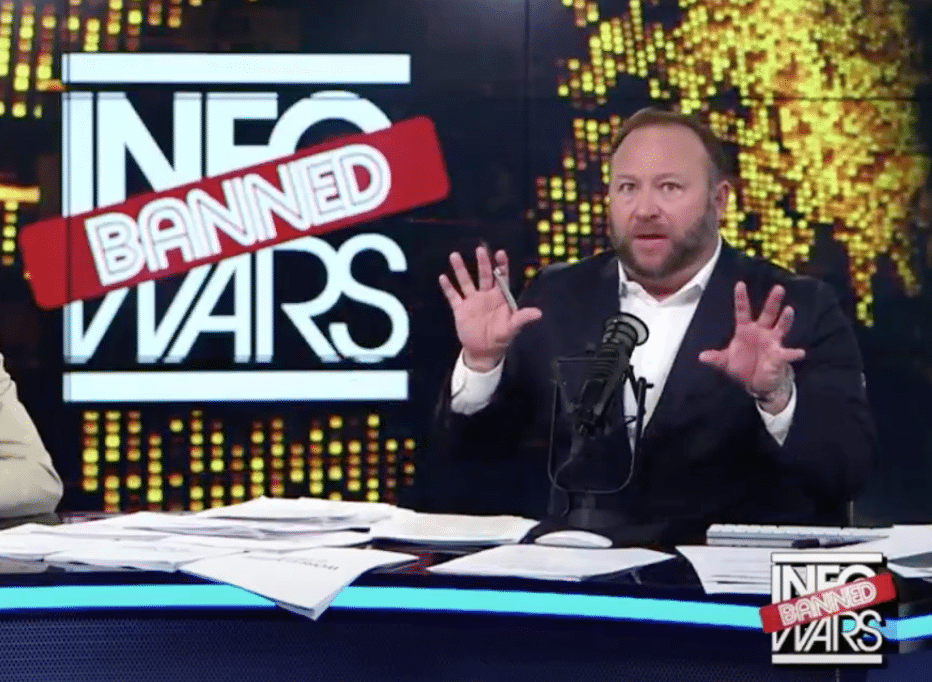
In spite of his reputation as mad conspiracy theorist, Jones is still technically a member of New Media. And the full impact of the bans on his business model has yet to be seen, however, the Pew Research Center’s latest research on social media and news consumption bodes ill for Mr. Jones. The survey found that over two-thirds of Americans consume news on social media.
Facebook was the dominant platform for news in 2017, with 45% of American adults saying they get news from the site. Youtube, which is owned by Google, came in second with 18%, followed by Twitter, also owned by Google, and then Instagram, owned by Facebook at 7%. The fact that tech giants occupy such a large audience for the news means that people are receiving their news through the screening of such tech giants’ algorithms, PR agendas, and the companies’ rules on “bullying” or other content regulations.
The crackdown on Alex Jones, along with a spate of bans from the week before, is the product of Facebook’s “Election Partnership” with a group called the Atlantic Council. Since the 2016 Presidential Election, Facebook has been under pressure to take preventative measures against the distribution of false information on its platform. The partnership is meant to combat the spread of misinformation during elections around the world, and will rely on the Atlantic Council’s Digital Forensic Research Lab.
The Atlantic Council was formed in 1961 by a group of former U.S. Secretaries of State to promote the North Atlantic Treaty organization, and since then it has continued to welcome home high-ranking U.S. security and foreign policy officials to its numbers. The current board of directors includes many former officials, such as CIA chief Michael Hayden, acting CIA head Michael Morell, Homeland Security chief Michael Chertoff, and famed diplomat Henry Kissinger.

Citing the fact that the CIA has been tasked with the distribution of inaccurate information to affect elections in other countries, Rolling Stone expressed concern over foxes in the henhouse. Rolling Stone’s piece focused special attention on Henry Kissinger, who regularly distributed inaccurate information to the press during the Nixon administration.
As private entities, Facebook and Google have leeway to limit speech on their platforms. However, the fact that of the $88 billion in global digital advertising revenue growth in 2017, 90% went to Google and Facebook, raises the question of whether or not the two companies’ platforms monopolize digital media distribution. A confrontation like this echos the antitrust crackdown that E.U.’s Margrethe Verganser initiated last month. If the two companies constitute a monopoly, then they would, under U.S. law, need to be broken up or regulated as public utilities subject to the First Amendment.
[Title Image by Cherie Cullen for the US Army]
Diego Lynch, LIMA CHARLIE NEWS
[Ashley Bogdan contributed to this article]
Lima Charlie provides global news, featuring insight & analysis by military veterans and service members Worldwide.
For up-to-date news, please follow us on twitter at @LimaCharlieNews
In case you missed it:

![Image As big media challenges the President, tech giants have become the gatekeepers for online news [Lima Charlie News][Photo: Cherie Cullen for the US Army]](https://limacharlienews.com/wp-content/uploads/2018/08/1599px-Reporter_raising_hand_at_US_Army_press_conference.jpg)

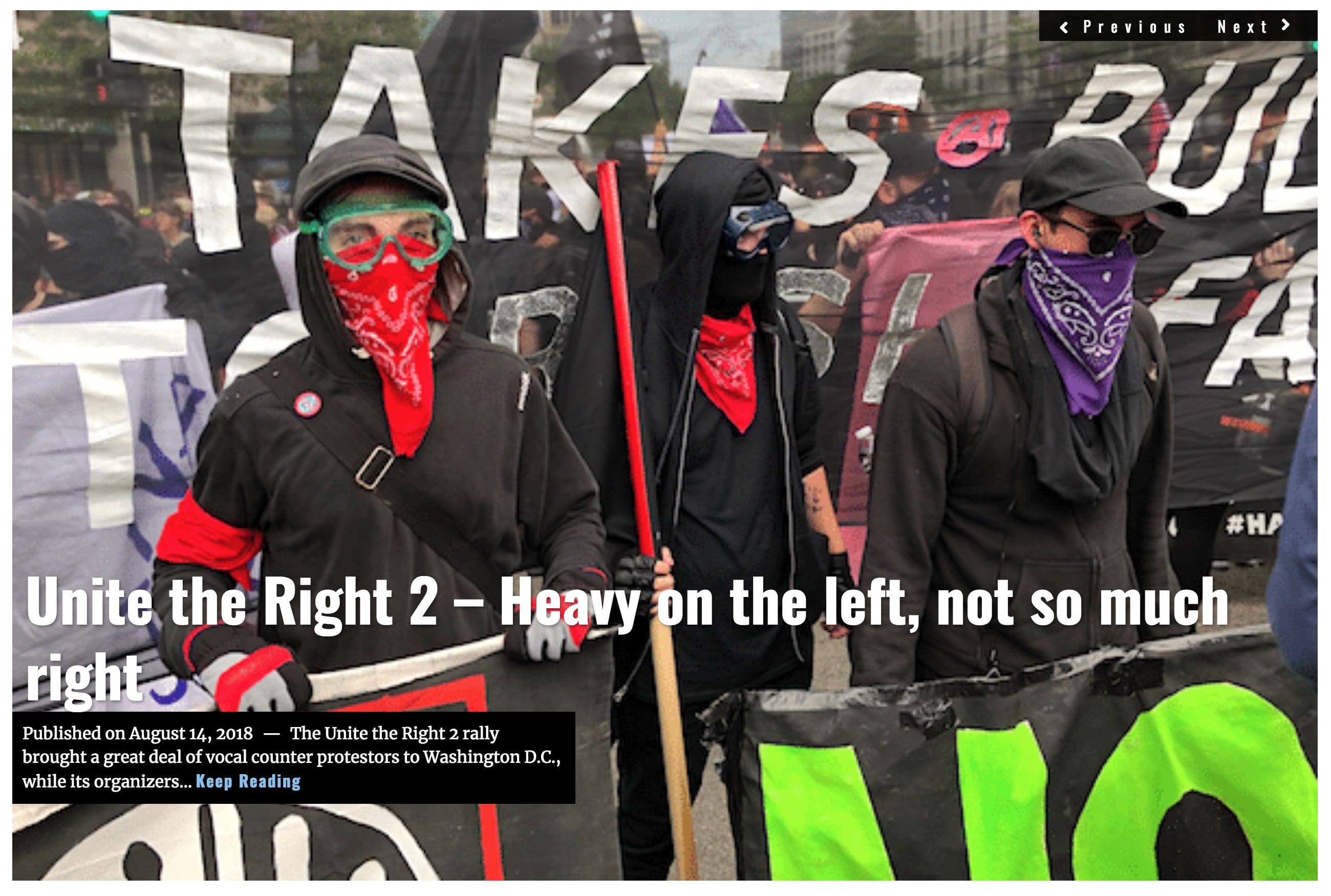
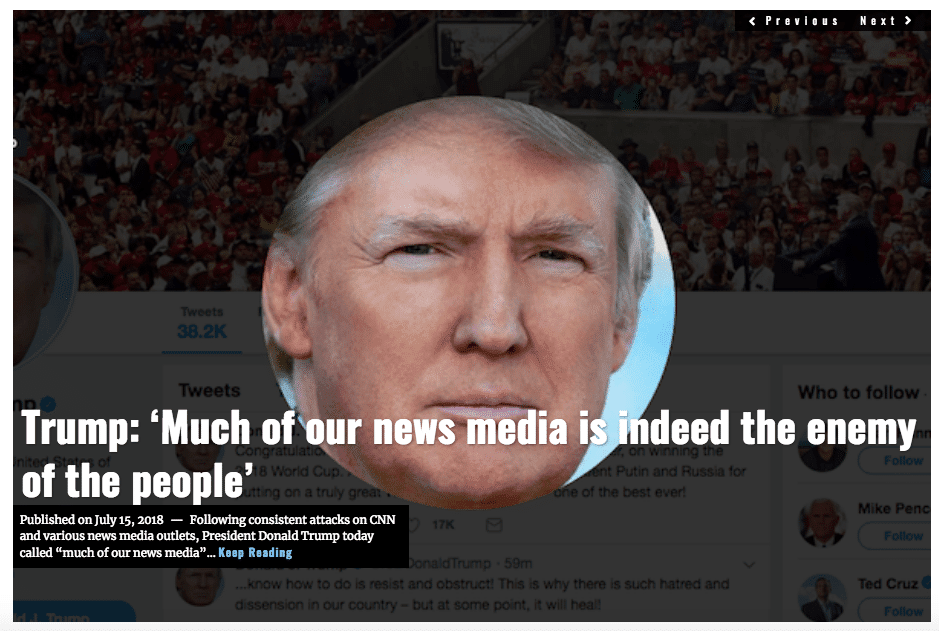
![Image World Press Freedom Day has us asking ‘What is the state of free press in democracies worldwide, and why has America’s free press ranking dropped?' [Lima Charlie News]](https://limacharlienews.com/wp-content/uploads/2019/05/World-Press-Freedom-Day-01-480x384.png)
![Image We Join the Boston Globe in Condemnation of President Trump’s Statements on Journalists [Lima Charlie News]](https://limacharlienews.com/wp-content/uploads/2018/08/Free-Press-Lima-Charlie-News-480x384.png)
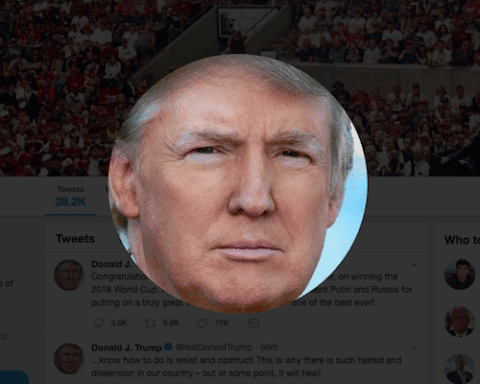



![Image Memorial Day may soon be a remembrance of democracy and those who had the courage to defend it [Lima Charlie News]](https://limacharlienews.com/wp-content/uploads/2018/05/Memorial-Day-may-soon-be-a-remembrance-of-democracy-and-those-who-had-the-courage-to-defend-it-Lima-Charlie-News-480x384.png)
![The Mind of Bolton - AUMF and the New Iran War [Lima Charlie News]](https://limacharlienews.com/wp-content/uploads/2019/05/Inside-the-mind-of-Bolton-Lima-Charlie-News-main-01-480x384.png)
![Image World Press Freedom Day has us asking ‘What is the state of free press in democracies worldwide, and why has America’s free press ranking dropped?' [Lima Charlie News]](https://limacharlienews.com/wp-content/uploads/2019/05/World-Press-Freedom-Day-01-150x100.png)
![Image We Join the Boston Globe in Condemnation of President Trump’s Statements on Journalists [Lima Charlie News]](https://limacharlienews.com/wp-content/uploads/2018/08/Free-Press-Lima-Charlie-News-150x100.png)